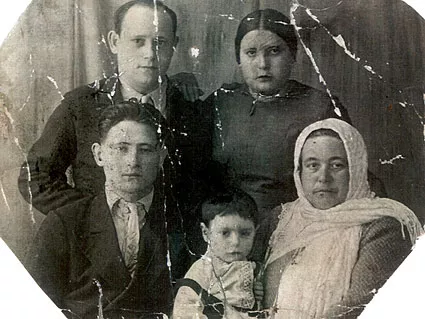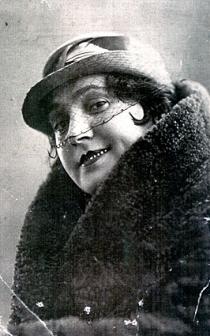In the first row from left to right are my mother Esther Grinberg, my son Izia Gershman and my brother Avrum Grinberg. Standing are my first husband Shunia Gershman and me. The photo was taken in 1936 in Berdichev.
In 1932 a famine began in the Ukraine. We were starving like all other people. At that time Shunia, the son of my mother's friend, Frida Gershman, arrived from Moscow. Shunia was a barber in Moscow. He came to visit his aunt in Berdichev. When he visited us and saw that we were starved he said to my mother, 'Let Sonia come with me, otherwise she'll starve to death here'. [Editor's note: Sarah was called Sonia at home.] My mother refused to let me go. Shunia stayed in Berdichev for a whole month trying to convince my mother. My mother was against me leaving with the young man. Before his departure from Berdichev, Shunia came to talk to my mother again. My mother said, 'You want to take her with you - marry her!'
He agreed. I didn't want to get married. I was a thin young girl of 16. Shunia seemed too old to me. I didn't dare to disobey my mother - it just wasn't the way I was raised. We had a small wedding party. The next day we left for Moscow. I was homesick, especially when I was at home alone. After two months Frida's brother Gedaliy came on a visit from Odessa. He asked me why I looked so sad and found out that I was missing my home. He decided to take me with him on his way back to Odessa. When we boarded the train I saw Shunia on the platform. The train began to roll, and Shunia was running along the platform waving his hand trying to tell me to get off, but I only waved back, feeling proud and happy.
I read an announcement on a fence about a private course in accountancy and convinced my father to pay the fee for a year's course. I liked studying there. The school was at some distance from my home and a young man, Alyosha Temnogradskiy, began to accompany me home. Alyosha was Ukrainian or Polish. Our neighbors told my mother about this young man. It was scandalous. My mother yelled, 'How can you do this being a married woman?' But I was a virgin, just a young girl. My mother wrote to my husband in Moscow. She asked Shunia whether he was going to live with me, and if so, he should come, if not he should tear the rabbi's certificate apart and leave me alone. Shunia arrived after a few days. He quit his job in Moscow to reunite with me.
I became a wife. We lived in a room in my parents' home. My mother watched that I strictly followed all requirements of a Jewish woman in regards to private life. During menstruation a husband wasn't allowed to touch his wife. After menstruation a woman had to go to the mikveh. My mother made sure that I went to the mikveh.
Shunia got a job at the barbershop. We got along well and my mother liked him a lot. Our son, Izia, was born in 1934. He had brit milah on the 8th day after he was born. It was a tradition in all Jewish families. We invited a rabbi who said a prayer, and a man from the synagogue conducted the ritual. We named my son after my husband's uncle. I was still a young girl and didn't feel like a mother. I went to the river with my friends and only when milk began to pour down my breasts, did I remember that it was time to feed my son. My mother looked after Izia, and I went to work.









